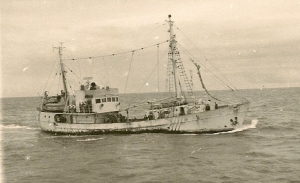
“Believe me, my young friend, there is nothing – absolutely nothing – half so much worth doing as simply messing about in boats.” – from Kenneth Grahame’s, ‘Wind In The Willows’
The boundless opportunities for exploration and discovery are carrying Divers further from the coastline. While in-shore diving from beach or day-boat still exercises its magic, the greater adventure lays beyond the horizon. Enthusiasts with limited vacation time are, in ever increasing numbers, indulging their passion for diving by opting to take a trip on a Live-aboard dive boat.
For the keen Diver nothing quite compares with the advantages offered by Live-aboard Dive vessels. Travelling to often remote and seldom visited locations, the marine life is more abundant, the visibility – generally – superior; lost or forgotten equipment hassles are minimized; there is a greater variety of diving – and more of it; greater opportunities for relaxing; and there is always the camaraderie fostered by a shared interest; a bond that can transcend social and cultural differences.
For some, however, there is occasionally a dark side to the bright joy of a live-aboard adventure – mal-de-mer.
In general terms almost anyone can fall victim to motion-sickness, a condition brought on when the balance mechanisms of the inner ear and the visual observations of the sufferer are at variance with one another.
Those who have never lived through this near-death experience can have no concept of its debilitating effects, nor of the extremes to which sufferers will go in order to prevent a re-occurrence.
Realistically, however, most people quickly become tolerant to a particular motion, only becoming susceptible when extreme conditions are encountered.
Symptoms may range from yawning and a general malaise through to full blown nausea and vomiting, a condition which often triggers a sympathetic response in others and a consequent increase in patient numbers.
‘Cures’ are as numerous as scales upon a fish and often place a heavy reliance on faith and the gullibility of the sufferer. “Eat a piece of bread soaked in a tablespoonful of vinegar.”. “Eat Ginger – or drink Ginger Beer before boarding a boat .”. Or “Nibble on a dry biscuit.”
Working on the basis that prevention is better than cure, experienced divers tend to avoid eating and drinking to excess – both of which can aggravate the onset of motion-sickness – the day and night prior to departure on a Live-aboard. Positioning yourself near the center and stern of the boat will also help to alleviate the effects until you become used to the motion; as can immediately lying down with eyes closed and resting.
There are a number of across-the-counter or prescription drugs aimed at combating and preventing motion-sickness but these should always be used with caution – particularly when diving. Many of these drugs cause drowsiness and their effects should always be closely monitored on shore well before any planned Dive trip. For preference consult a physician versed in diving medicine.
In any event modify your dive profile to allow for the effects of the motion-sickness drugs when combined with pressure at depth, by decreasing your maximum allowable depth and bottom time.
If a victim has been vomiting prior to the dive then they may well have become de-hydrated, a condition which favours the onset of decompression sickness. The chances are that they are also psychologically ill-prepared for the dive, placing a heavy duty of responsibility on the diver’s buddy.
While divers, once in the water, are generally immune to the effects of motion sickness, unless tethered to the boat by a line or holding on to the anchor cable, there are occasions when the effects of motion cause the diver to vomit. Quite apart from the technical difficulties of doing so through a regulator mouthpiece there’s the risk of inspiring sea-water or, through loss of buoyancy control, suffering an embolism.
Through all of this the good news is that very few people experience other than mild symptoms to which they quickly build a tolerance. In those instances where the effects have been more severe, and where the diver is anything less than one hundred per cent mentally and physically fit to dive, then that particular dive should be aborted – there’s always tomorrow.
—ENDS—
Categories: General
Leave a comment